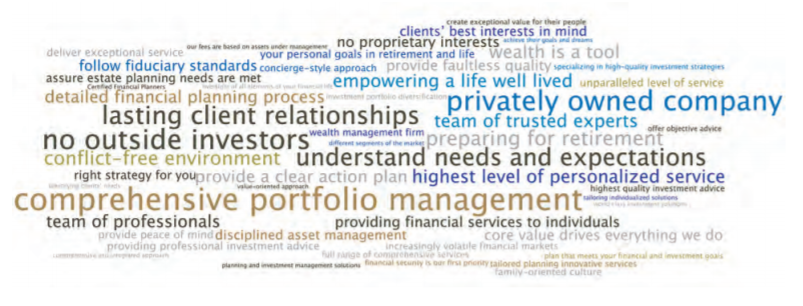Words matter. And so does communicating your value on the web and social media, a recent study says.
You already know that prospective clients can seem picky about whom they’ll work with. And for good reason.
They want the best for themselves and their families, and want to be sure you’re working for their best interests. As a study published by BNY Mellon’s Pershing says, “They want to know exactly how you will improve their lives, and why they should pick you over your competitors.”
That means it’s vital for prospects to recognize your true value. Setting yourself apart from the pack in an environment where fees are under pressure, competition is escalating and client attitudes are changing requires a unique, compelling value proposition that more than justifies your clients’ investment in you, Pershing says.
But how to know what works, what to say and what investors want to hear? To find out, Pershing mined the websites of some of Barron’s Top 100 Independent Financial Advisors to find the value themes and statements they used. Pershing then surveyed more than 1,000 high net worth investors to see what they thought about these value statements, which specific words they preferred, and where they look for information about advisors, among other things.
First off, rather than differentiating themselves, advisors are generally saying the same things. Many fall back on generic claims or trite clichés, Pershing says. Indeed, 63% of those high net worth investors surveyed agreed with the statement that all financial advisors make the same promises, making it difficult to distinguish between them.
—–
Language Top Advisors Use Most – And How Often They Use It
 This phrase cloud highlights the most popular value statement themes from value proposition statements harvested from the websites of 76 of Barron’s Top 100 Independent Financial Advisors. It illustrates how often those statements appear on top advisors’ websites. The “obvious take-away,” BNY Mellon’s Pershing says: Top advisors are saying good things, but too often, they’re saying the same things.
This phrase cloud highlights the most popular value statement themes from value proposition statements harvested from the websites of 76 of Barron’s Top 100 Independent Financial Advisors. It illustrates how often those statements appear on top advisors’ websites. The “obvious take-away,” BNY Mellon’s Pershing says: Top advisors are saying good things, but too often, they’re saying the same things.
—–
Some Sameness May Be a Good Thing, However
What’s interesting from the survey with investors is that they care so strongly about three common themes that Pershing suggests advisors include the themes on your website, acknowledging, however, that they won’t differentiate you from other advisors.
The themes are:
- Tailored solutions that meet your needs
- A fiduciary duty to work in your interests
- Committed to trust, integrity and accountability
In addition, press coverage in recent years has helped get the word “fiduciary” into public consciousness, providing a source of shared vocabulary between clients and advisors. Pershing says advisors should “turn up the volume” on trust, integrity and accountability as investors strongly care about these issues, though advisors tend to speak too quietly about them. Speaking more openly about the advisor firm’s core values also appears to be helping advisors engage clients on a deeper and more authentic level.
Clients also want help with their entire lifestyle, including life goals, not just finances ─ a notable change from research Pershing conducted earlier. The finding may not be anything new to those advisors who are already using a “goals-based” process with their clients. This approach focuses more on accomplishing those things clients want to achieve based on their importance.

Pershing’s research suggests that themes such as, “conservative investment approach,” “capital preservation,” and “navigate volatile market conditions” deserve a bit more real estate on advisors’ websites. “Protection and capital preservation aren’t necessarily big attention-getters or unique points of distinction. But when the time comes, they do help drive investors’ decision-making process,” Pershing says.
Four Ingredients to Effective Value Propositions
When it comes to value propositions, those that rated highest among investors included: firm attributes (a feature, such as the size or experience of your firm); benefits from working with your firm; reason (a rational explanation of how firm attributes produce client benefits); and emotion (an appeal to feelings, such as hope, worry or aspiration).
For example, 79% of investors responded favorably to this value proposition: “We built our firm on integrity and trust, because doing what is right for you is better for our business in the long run.” In contrast, only 42% of investors responded favorable to this value proposition, which included only a benefit and a reason: “We help business owners balance the needs of their business and their personal goals.”
Finally, with more prospective clients researching advisors on the web and social media, what advisors post on platforms like Facebook can make a big impact, especially from a people- or relationship-focused viewpoint, Pershing says. Of the more than 1,000 investors surveyed, one in three checked an advisor’s Facebook page, and more than 50% decided not to work with that advisor based on something they saw. It gets worse for investors under 40. Two in three checked out an advisor’s Facebook page, and more than 66% decided not to work with them based on something they saw.
“Make sure everything you post on Facebook reflects your value proposition – or don’t post it,” Pershing says.
Does your value proposition sound the same as everyone else? If so, we can help! Contact us today.
Source:
https://information.pershing.com/rs/651-GHF-471/images/per-advisor-value-propositions.pdf
This article is for informational and educational purposes and is not designed, nor intended to be applicable to any person’s individual circumstances. It should not be considered as investment advice, nor does it constitute a recommendation that anyone engage in (or refrain from) a particular course of action.
The Quantum Group USA, LLC, its employees and representatives are not authorized to give tax or legal advice. You and your clients are encouraged to seek advice from a qualified tax professional or legal counsel.
FOR FINANCIAL PROFESSIONAL USE ONLY – NOT FOR USE WITH THE PUBLIC


